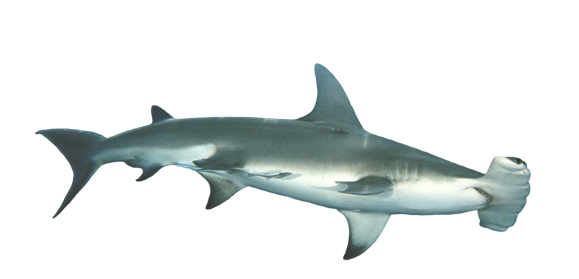Shark, H.H. – Great

View Regulations

Scientific Name
Sphyrna mokarran


Common Names
Giant hammerhead, Great hammerhead, Squat-headed hammerhead shark


Description
The Great Hammerhead shark is characterized by their hammer shaped head, which in this subspecies is nearly straight and defined by a shallow indentation in the center of adult heads. Their coloration ranges from a darker-brown to a light grey, though sometimes they can take on an olive green color as well. These colors blend to white on their undersides.


Habitat & Behaviour
The Great Hammerhead Shark patrols mid to deep temperate and tropical waters. Favoring temperate waters the Great Hammerhead is a migratory shark that moves southward for the winter months. This shark hunts in coastal areas and rests near shelves or larger drop offs.


Natural Prey
The Great Hammerhead has a diverse diet, choosing to hunt at dusk and at dawn. It can eat anything ranging from other sharks to fish, cephalopods and crabs, though they favor certain types of rays.


Handling Tips
It goes without saying that you should steer well clear of any sharks mouth. They also have rough skin which if whipped on you can leave a rash. Little ones wiggle a quite a bit, grab behind gills and hold tail. Larger sharks tail snare if you can and keep in water. When releasing sharks try to leave as little line as possible. Hooks rot out in a few weeks. Pro Angler supports shark conservation and recommends you catch and release. If brought into the boat, leave for 15-20 minutes before handling, shark will tire and be easier to handle as their body is very strong as well. Known to even play dead before snapping at you, so be careful!

- Lucky Tackle Box
- Billfish Bounty in the Heart of the Mayan World – Guatemala
- The Best Species of Shark to Catch
- How to Catch a Shark: what equipment do you need?
- The Best Winter Fishing Spots in Texas





